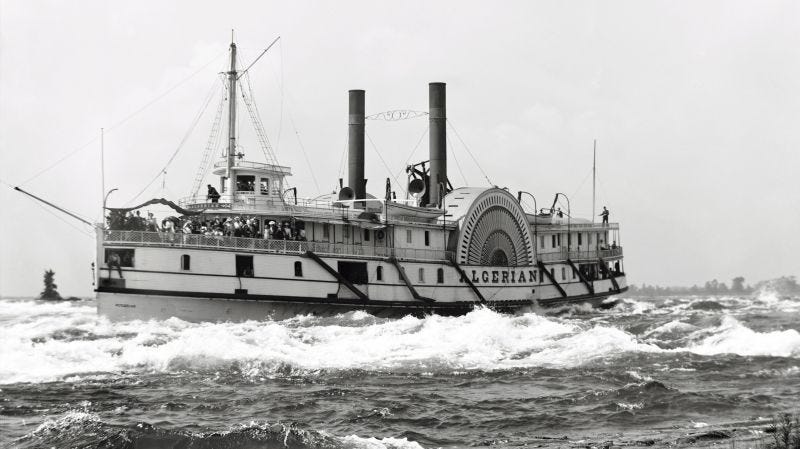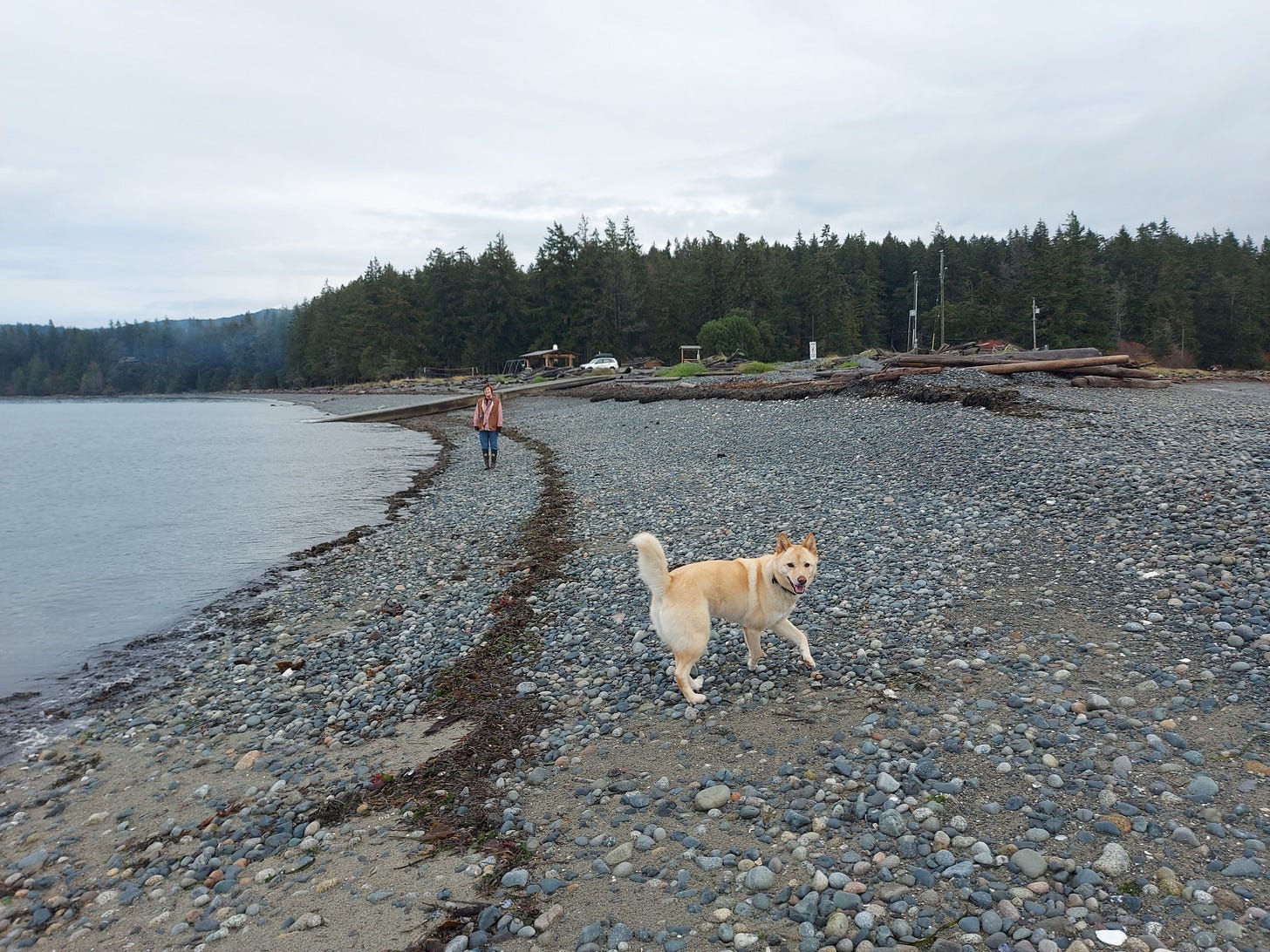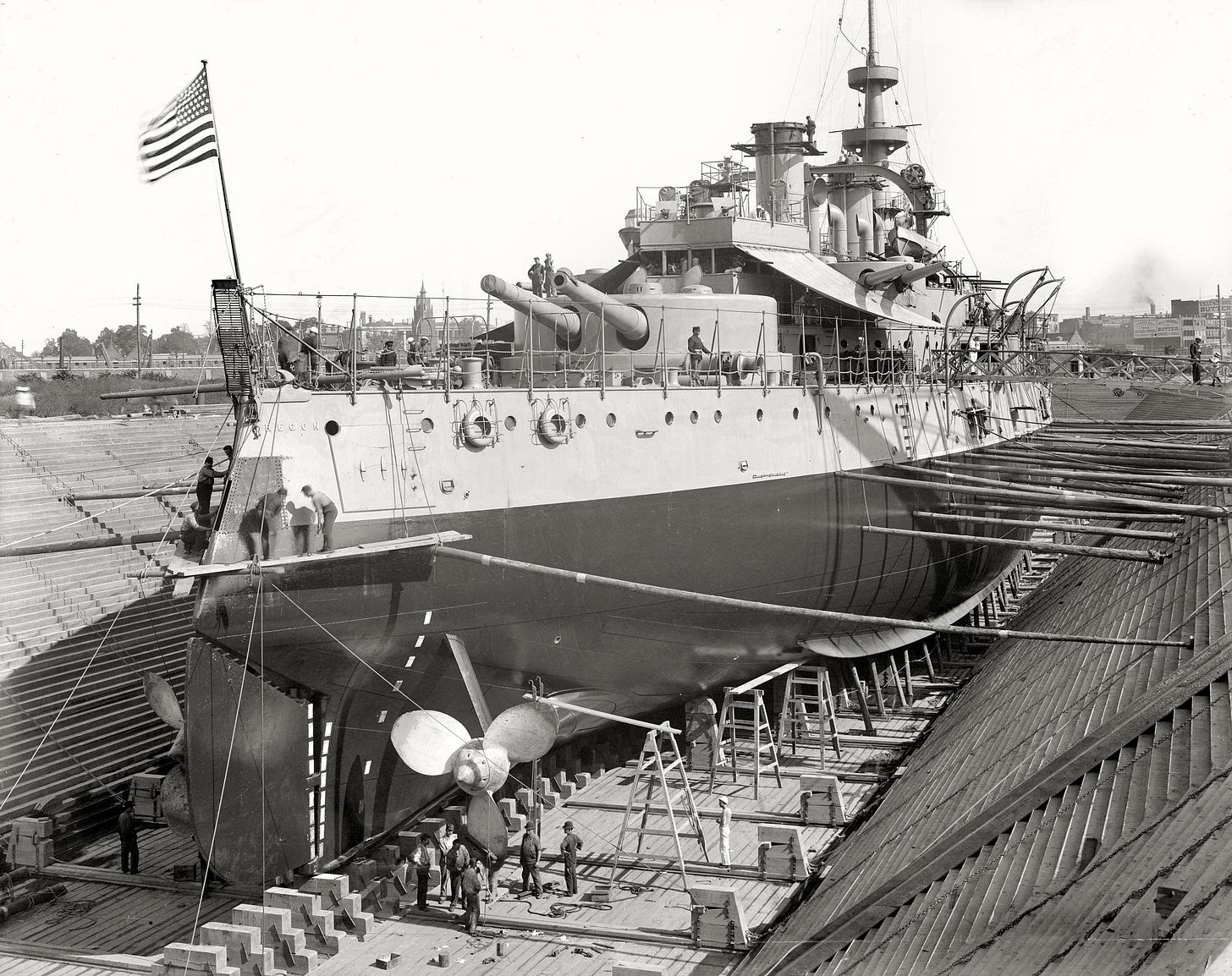The Texada Island Ore Grab!
The forgotten scandal that brought down British Columbia's second premier, Amor de Cosmos
February 7th, 1874
Eight hundred people marched through the streets of Victoria, singing “we’ll hang de Cosmos up a sour apple tree!”1 The mob stopped to hang his effigy before they stormed past police, into the halls of the House of Assembly. Two days later, Amor de Cosmos resigned as British Columbia’s second Premier.2
A Royal Commission was soon formed to investigate allegations that de Cosmos and other members of Victoria’s political elite had illegally conspired to buy 50,000 acres on Texada Island. With dense deposits of iron, gold, silver, copper, and limestone, it was considered Canada’s most precious rock and “the richest twenty-five square miles in British Columbia.”3 The public felt they had been robbed.
It wasn’t an isolated incident. The province had recently opened up to widespread settlement and huge tracts of land were getting gobbled up by speculators.
The Texada scandal hints at how the average British Columbian didn’t always see the benefit of this real estate boom - how time and again the most valuable land found its way into the hands of a powerful elite.
Who was Amor de Cosmos?
Amor de Cosmos was born William Smith. Instead of going by the standard Bill, or Willie, he legally changed his name to Amor de Cosmos (lover of the universe) when he was twenty-nine.4
He was an eccentric character, straight out of Deadwood or a Sergio Leone movie. He dressed flamboyantly in an “expensive white shirt front about which a heavy gold chain meandered in connection with a flowing beard and locks.”5 By most accounts, he was a pretty abrasive guy. His contemporaries described him as having “all the eccentricities of a comet without any of its brilliance,” “fearfully tedious,” and “a most egotistical man.”67
De Cosmos made his money during the California gold rush - not by mining, but by selling portraits to prospectors at his photography studio in the rough-and-tumble camp of Mud Springs. In 1858, with news of the Fraser River gold rush, he travelled north to join his brother in Victoria. He founded the British Colonist (now the Times Colonist, BC’s longest-running newspaper) and had a long, successful political career in the capital. He was elected Premier in 1872 and is considered the province’s Father of Confederation.8
As de Cosmos aged, he got weird. He was known to wander the streets of Victoria, rambling, crying, and getting into fistfights.9 In 1895, he was declared to be of “unsound mind” and unable to administer his estate.10
Despite being a colourful and foundational figure in BC’s history, few remember Amor de Cosmos today - his only memento is an unremarkable lake surrounded by cut blocks at the end of a forest service road north of Campbell River.

Seeds of a Scandal
Before de Cosmos became premier, British Columbia was a British colony. It was controlled by James Douglas, an autocratic Governor of mixed African-European heritage. He had a Cree wife and was relatively fair (for the time) in his dealings with Indigenous people. He was wary of the unruly gold prospectors flooding into the province and insisted land would only be opened to settlement after negotiation between Indigenous nations and the British Crown.11
He wanted to avoid conflict and expensive military intervention:
“Every means in the power of this Government, will also be exerted to keep the Colonists together, and to prevent them from straggling into the Indian Country, and forming detached settlements, which from their weakness and isolation, would be greatly exposed to Indian depredations, and become a source of disquiet to the Colony.”12
In the British Colonist, de Cosmos portrayed Douglas as a gatekeeping aristocrat holding back the common man from what was rightfully his. De Cosmos wanted to “open the entire Colony to settlement” and argued that Douglas was being overly generous toward Indigenous people:
“Shall we allow a few red vagrants to prevent forever industrious settlers from settling on the unoccupied lands? Not at all… Locate reservations for them on which to earn their own living, and if they trespass on white settlers punish them severely. A few lessons would soon enable them to form a correct estimation of their own inferiority.”13
This was reflective of the general vibe at the time. The Fraser River gold rush had turned Victoria, practically overnight, from a tight-knit colonial outpost of 500 into a boom town of over 20,000. The new arrivals wanted their piece of the pie.
When de Cosmos was elected Premier in 1872, James Douglas was safely retired from political office. Instead, Joseph Trutch (a famous racist) was the Crown’s representative. As Lieutenant Governor, he denied the existence of Indigenous title and reduced the size of reserves established under Douglas by ninety-one percent.14 De Cosmos stacked his cabinet with loyal friends, notably Robert Beaven as Land Commissioner - a powerful position responsible for issuing land grants.15
The stage was set for a scandal.
But first,
How The Law Said You Were Supposed to Get Land Back Then
(from the Land Ordinance Act of 1870)
Be male16, a British Subject, and eighteen or older.
Visit a piece of “unoccupied, unsurveyed, and unreserved Crown Lands.” You can claim 160 acres west of the Coast Range mountains and 320 acres to the east.
Bring the Land Commissioner a written description of the land. Pay a $2 application fee.
If your application is approved, write your name on wooden stakes and hammer them into the ground at each corner of your lot.
Pay $1 per acre.
Make sure the land is continuously occupied for the next two years - either by yourself, your family, or your agent (as long as your agent isn’t an Indian or a Chinaman).17
The land is yours!
The Scandal
Despite being incredibly easy to get land at the time ($1 an acre!), de Cosmos still got greedy.
In 1871, whaler and prospector Harry Trim was working out of Blubber Bay on Texada Island, when he noticed his compass was acting funny. He explored the island on foot, and soon discovered “exposed [iron] veins 100 feet wide and traceable in many spots for a distance of 200 feet.” Two years later, he had a sample of the ore assayed at the office of Sewell Moody. It was found to be high-quality, 69 percent iron ore.18

Moody immediately hit up his political connections in Victoria to let them in on the scoop. They chartered a boat and headed straight for Texada Island to pre-empt the iron-rich land. Onboard were Amor de Cosmos (Premier), George Walkem (Attorney General), William Dalby (Mayor of Victoria), and JC Hughes (Member of the Legislative Assembly).
Back in Victoria, they registered their claim with Land Commissioner Robert Beaven. Beaven received and approved applications from de Cosmos’ party as late as August 29, 1873. Suspiciously, without any recorded reason, he rejected competing claims made by several members of another party a week earlier, on August 21, 1873.19
These are the facts agreed on by the Royal Commission’s investigation into the Acquisition of Texada Island. It was further alleged that, before completing the mandatory two-year occupation of the land, de Cosmos tried to sell the property to Prime Minister John A. MacDonald for $150,000, with a generous five percent commission for himself. When the deal fell through, he supposedly floated Texada Island Iron Company stock on the London market while in England on government business.20
Unfortunately, we don’t know the true extent of the scandal. The Royal Commission limply concluded their investigation by saying:
“Although there were suspicious circumstances surrounding the pre-emptions on Texada Island… there is not sufficient evidence to believe that any members of the government [acted in] a manner prejudicial to the public.”
What happened to the land?
In 1875, a year after the Royal Commission cleared de Cosmos of all wrongdoing, the Land Ordinance Act was replaced by the Land Act. It increased the limit on land sales from 160 acres to 640 acres.21

The same year, de Cosmos and his buddies put together a sales pitch for their consolidated lands. It estimates their holdings at over 11 million tonnes of iron ore and assures investors that “unskilled labor - Indian, Chinese, European - is obtainable at moderate rates: 75 cents to $1.50 per day.” The Indians in particular “are anxious for work. When started to work young, they keep steady at it, and make first class workers.”
The prospective buyer, on the other hand, can expect to make annual profits of $1,485,000.22
That doesn’t include the profits from selling housing to the miners and workers:
“Another source of revenue would be the sale of the townsite… the return from the sale of town lots in two or three years may safely be put down at $150,000, besides reserved town lots that a few years later would be very valuable.”
The Puget Sound Iron Company saw dollar signs and bought the land in 1875. They built a blast furnace in Irondale, Washington to process the Texada ore into pig iron that was then sold to foundries all over the Pacific Coast. One of their major clients was Union Iron Works who used the iron to build ships for the United States Navy - including the battleship Oregon which would go on to put down anti-imperial resistance overseas in the Philippine Revolution (1899) and China’s Boxer Uprising (1900).23
Over the next century, the Texada lands would change hands a few times. When its mines were finally exhausted in 1976, they had produced 20,880,900 tonnes of iron ore, 26,740,300 kilograms of copper, 23,644 kg of silver, and 887 kg of gold.
Bringing it home
Although we’ve mostly forgotten about Amor de Cosmos, we’re still reeling from his legacy in many ways. His debate with Governor Douglas was never really resolved:
Are unruly speculators unjustly profiting off of unceded Indigenous lands? Or, are Indigenous claims to the land holding us back from our collective wealth?
Recently, the Land Act has come back into focus. In 2019, the legislature voted unanimously to adopt the United Nations Declaration on the Rights of Indigenous People (UNDRIP) into law. Earlier this year, the Province proposed modest amendments to bring the Land Act into line with UNDRIP.
There was immediate panic and fear-mongering in the media. John Rustad (Leader of the Opposition) added fuel to the fire and called the proposed amendments “an assault on your private property rights and our shared rights to use Crown Land.” He has promised to repeal UNDRIP and defend BC’s mining, forestry, and agriculture sectors.24
It’s hard not to hear echoes of Amor de Cosmos in politicians like Rustad: the current government is run by an out-of-touch elite that’s overly generous toward Indigenous people and preventing the common man from getting what’s rightfully his. It was a political strategy that made de Cosmos and his buddies a lot of money.
But, it was a scam. One that caused significant, lasting harm to Indigenous communities and pissed off enough people that they did a mini-insurrection to oust de Cosmos from the Premier’s office.
If we look at Rustad’s public disclosure statement, there are hints that (like de Cosmos) his motives for denying Indigenous title might not be exclusively in the public’s interest. Aside from his home in Vanderhoof, he owns a wood lot license and four large parcels of land in northern BC. Harking back to the gold rush era, his only other investments in a strangely undiversified portfolio are gold and precious metals.
I, for one, can’t wait until we get to knock down the doors of the Legislature and sing “Hang him on the sour apple tree” again.
Sung to the tune of "The Battle Hymn of the Republic" and “Solidarity Forever”, a popular song at the time was called “Hang him on the sour apple tree”, about the prosecution of former Confederate politicians and officers.
Daily Colonist Feb 10, 1874. Also, “Texhada” Island Ore Grab, Texada Heritage Society.
Texada Time Warp. British Columbia Magazine. Cherie Thiessen, 2022.
“I desire not to adopt the name of Amor De Cosmos because it smacks of a foreign title, but because it is an unusual name and its meaning tells what I love most, viz: Love of order, beauty, the world, the universe.” His petition to the California Legislature passed in a vote of 41-20. B.C.’s Most Eccentric Premier, Who Changed His Name to “Love of the Cosmos”
Amor de Cosmos Juggles a Sour Grass Steak in Kalama. The Spokesman-Review. Dec. 16, 1895
Walkem, George Anthony. Dictionary of Canadian Biography.
De Cosmoos, Amor. Dictionary of Canadian Biography.
Fathers of Confederation. Canadian Encyclopedia
B.C.’s Most Eccentric Premier, Who Changed His Name to “Love of the Cosmos”. Montecristo Magazine. Tom Hawthorn. 2020.
Daily Colonist. Dec 4, 1895
As was (and still is) the law, King George’s Royal Proclamation of 1763
James Douglas to Earl Grey, 15 April 1852.
Daily Colonist. March 8, 1861. Amor De Cosmos
In 1850 Trutch wrote of West Coast Indigenous people: "I think they are the ugliest and laziest creatures I ever saw and we should as soon think of being afraid of our dogs as of them." Joseph Trutch and Indian Land Policy R Fisher, 1918.
Beaven, Robert Dictionary of Canadian Biography
Women couldn’t legally purchase land until the Married Women’s Property Act of 1887. It wasn’t until Edwards v Canada in 1930 that women were declared legal persons and given equal property rights to men.
“The occupation herein required, shall mean a continuous bona fide personal residence of the settler, his agent, or family, on the land recorded by such settler; but Indians or Chinamen shall not be considered agents.” Land Ordinance Act of 1870
Harry Trim Texada Heritage Society
It was a small clique that was buying up the province’s most valuable lands in this era. Israel Powell and Major Dupont, who I wrote about in my last article, were members of the rejected party.
The Texhada Grab! Daily Colonist Feb 10, 1884.
Texada Iron Mines Amor de Cosmos. 1885
Irondale: The Would Be Pittsburgh of the Pacific Northwest Columbia. Dianne Britton, 1994.
BC must stop the NDPs assault on land rights and repeal UNDRIP. John Rustad, Feb 1, 2024.












Try Dean Unger's Historical Fiction "A Den of Thieves, Vol. 1 & 2". It is a page turner and involves this very topic.
Yes...wasn't aware of this period in Amor de Cosmos's life. So thanks for this.
No fines, no incarceration. No real evidence of illegal activity.
It wasn't the first time Amor was a land speculator. Back in 1858, a few months after he arrived on Vancouver island, he (and others) heard rumours that the little Fraser River hamlet of Derby (near Fort Langley) was to be the site of the new capital city of the mainland colony. Hustled up river and started buying up property. Too bad! New Westminster got the nod instead! Win some, lose some.
Of course, he wasn't the only real estate developer around what was still called Fort Victoria. The biggest one was Alfred Waddington--and he and de Cosmos struck up a mutually beneficial friendship right away. Bonus! De Cosmos owned the first newspaper in the colony--which became a PR outlet for Waddington's Bute Inlet Road Company...again, incursion into "Indian territory." This time paid for in blood.
Read more in my book, The Chilcotin War. The only real "Indian war" in Canadian history.
Cheers.
Rich Mole